关于模块分如下几个方面:
- 环境模块
- 独立模块
- 全局声明
思考题type A = string | number,请问A的作用域是?
- 当前文件内。(*.ts/*.tsx)
- 整个项目内。(*.d.ts)
- 以上都有可能。 如左侧思考题A的作用域应该选第三项,以上都有可能。
这是因为可以在项目中的tsconfig.json内配置include包含的文件夹,使得类型的作用域能够扩大。
环境模块
关于lib.dom.d.ts
const Button = document.getElementById('b')
// 请问Button的类型是什么?
// 请问类型 HTMLElement 是哪来的?
// Ctrl + 点击 getElementById 可以查看类型声明Button的类型是HTMLElement,类型HTMLElement来自于lib.dom.d.ts。
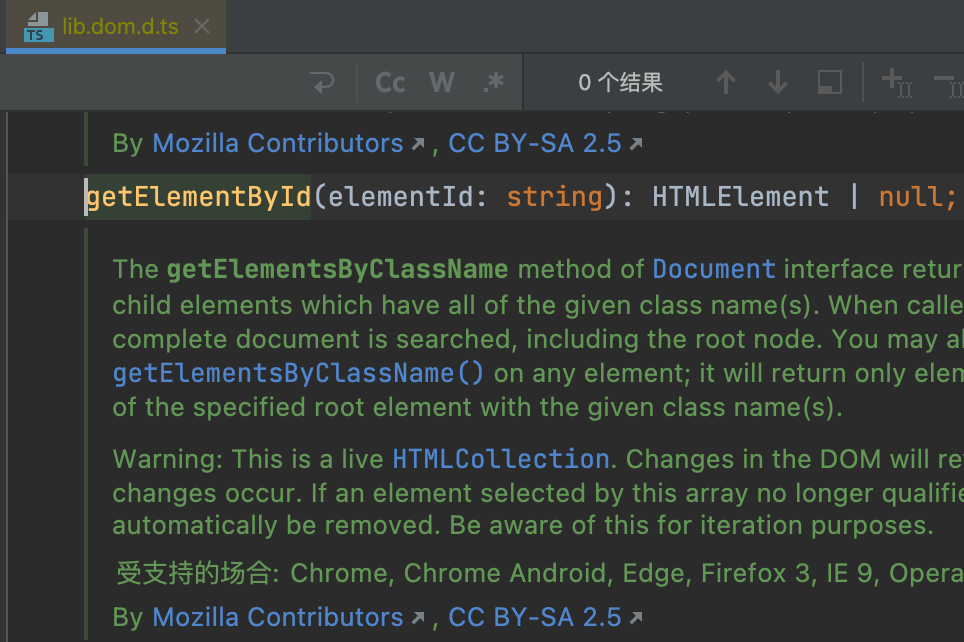
可以发现在lib.dom.d.ts内有很多相同名的interface声明,这是因为interface会合并。
查看tsconfig.json内配置项的"lib": ["esnext", "DOM"],esnext�即最新的es语法,dom即运行在浏览器。
如上图所示,可以发现DOM的定义顺便把BOM也定义在了一起,他们写在一起。可以理解**lib.dom.d.ts**就是环境模块。
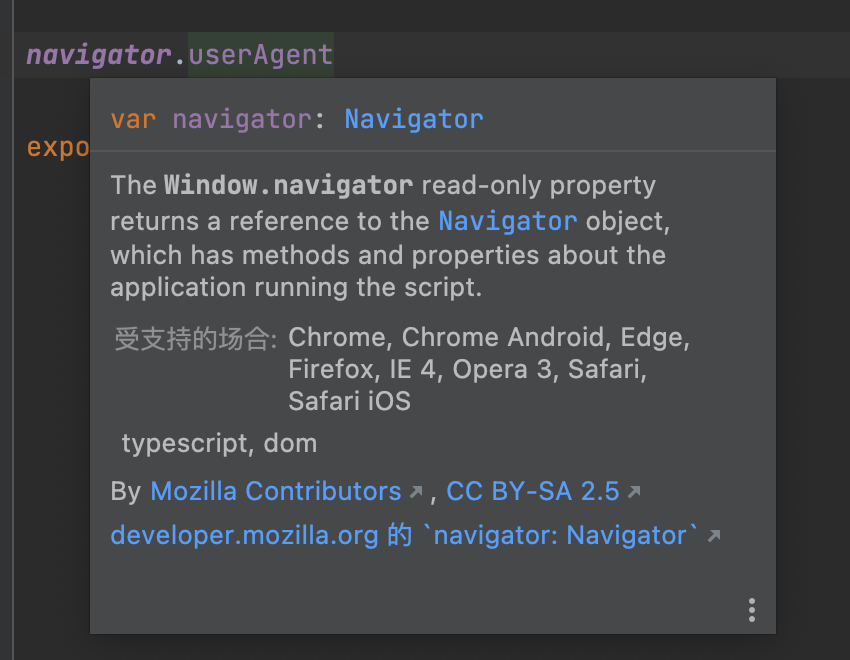
但这个文件是谁撰写的内,它是由mhegazy这个人写的有一万八千多行,在2014年上传至Github的。而为什么vscode和webstorm知道要引入lib.dom.d.ts呢?
这是因为在tsconfig.json文件内配置了lib项。
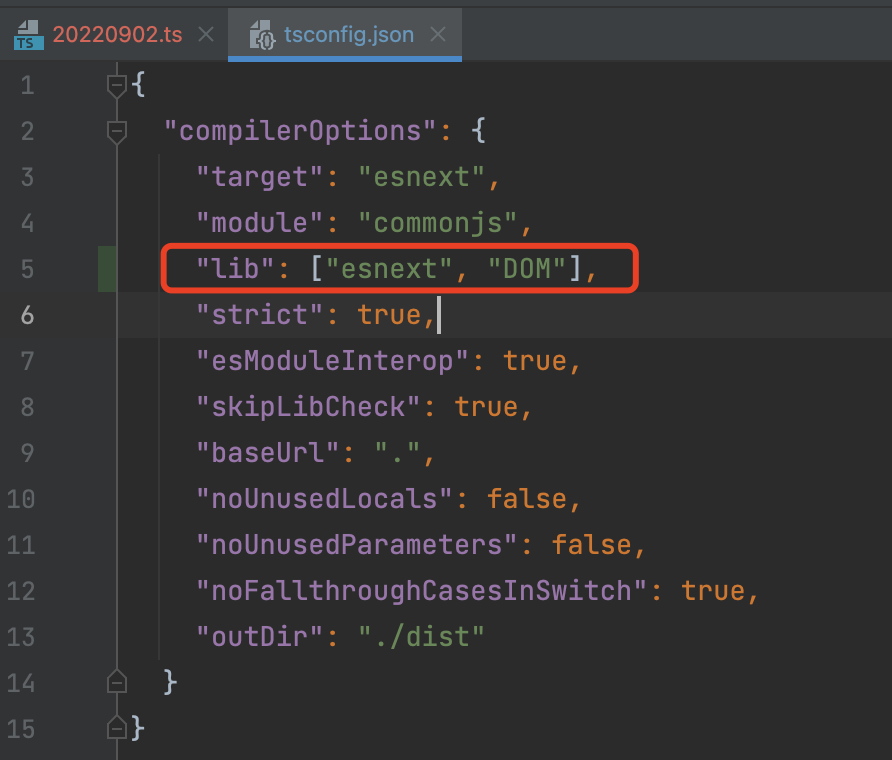
关于node_module/@types
import {readFile} from 'fs'
// ^--- Cannot fin module 'fs' or ...(2307)若在文件中写如上代码,使用node下的fs,会发现报错了,复制报错信息到Google得到解决方案是需要安装关于node的类型包,npm i -d @types/node。
这是因为node没有标准规范,但是dom有w3c的规范准则,每年会进行更新,可以内置在lib.dom.d.ts文件内。
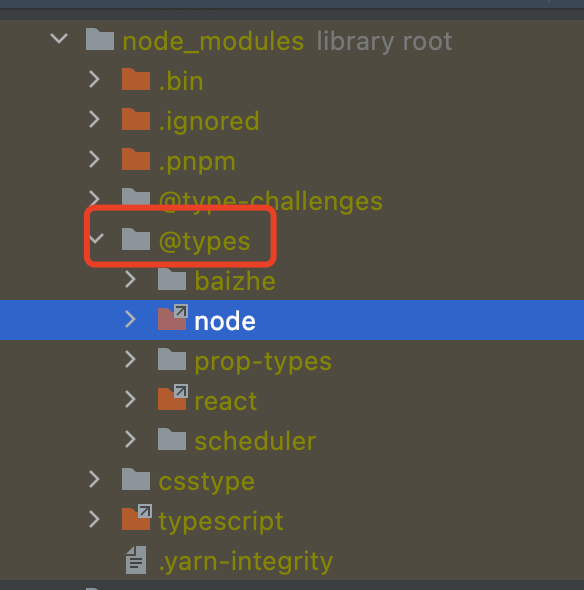
如上右图所示,可以发现在node\_modules/@types内有node的类型。所以猜想node\_modules/@types里的类型声明会被自动引入。
若tsconfig.json中的include没有指定导入那些类型模块,**node\_modules/@types**内的类型声明会自动引入。
举例@types/node到引入步骤:
- 看每个目录里
package.json到types字段。 - 读取对应文件。
- 遇到
/// <reference.../>则读取之。 - 遇到
import也读取之。
如果发现@types/目录下有很多内容,但是指向引入一部分类型,则可以在tsconfig.json的types数组中加入想要引入到部分。
类型的作用域
\*.ts中的Type作用于当前文件。\*.d.ts中的Type作用于整个项目。node\_modules/@types/\*中的Type作用于整个项目。
举例使用node\_modules/@types/\*的写法:
首先在node\_modules/@types的目录下创建文件夹,文件夹内有package.json和index.d.ts文件。
然后就可以在其他地方使用了。前提是关闭了白名单即(tsconfig.json的include),在使用的时候要开启要用的环境,加到白名单内。
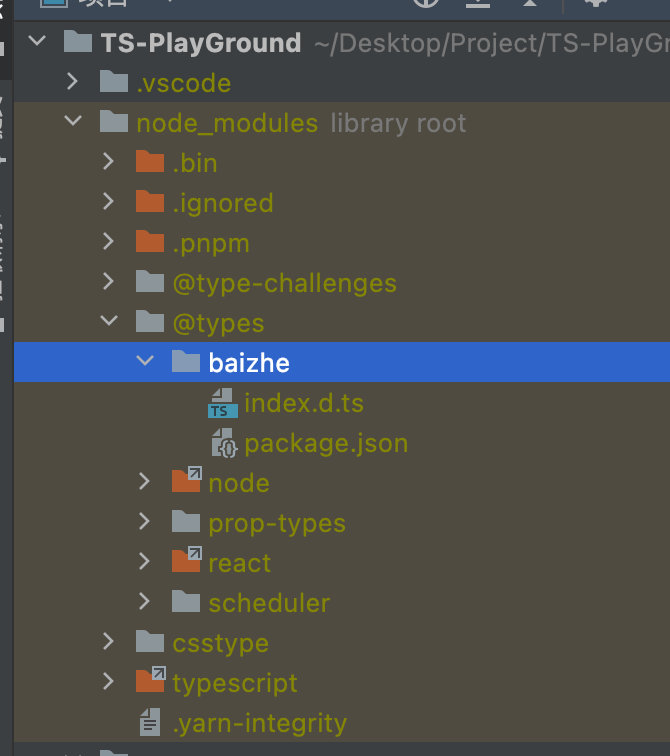

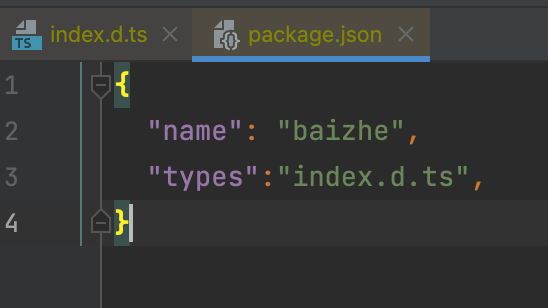
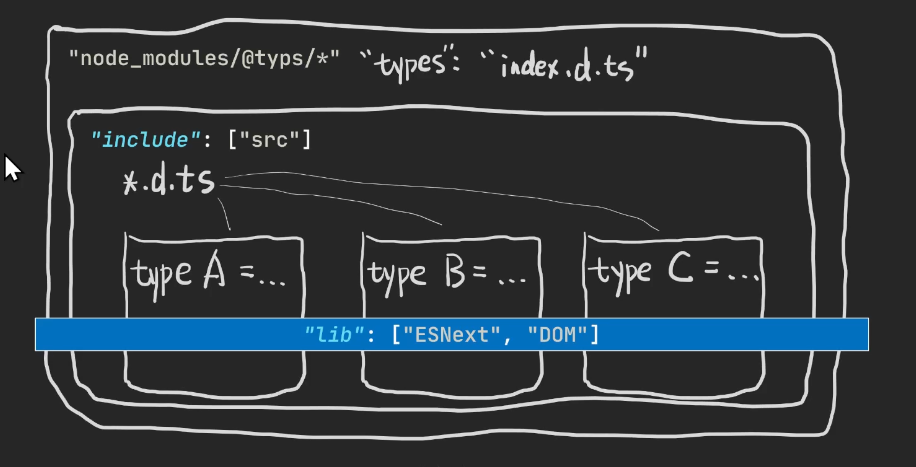
由于直接写在node\_modules/@types/\*内的类型,别人无法使用,若是想要别人使用应该发布到npm上让别人去下载。
如果a.ts和b.ts想共享类型,该怎么办?有两种方法如下所示。
export type+import type——推荐使用
// b.ts
export type B = string
// a.ts
import type { B } from './b'
type A = B | numberexport+import+tsconfig.json内的"isolatedModules": false——不推荐使用
// b.ts
type B = string
export { B }
// a.ts
import { B } from './b';
type A = B | number独立模块
独立模块(Isolated Models)
独立模块是指每个ts文件导出的,而.d.ts文件不需要导出。
import { TypeA, FnA } from 'xxx';
FnA()
export { TypeA, FnA }如上代码片段所示,编译称JS的时候TypeA是否擦除,如果不看xxx的内容无法确定,则称该文件不是独立模块。
由于JavaScript不懂Type是什么,所以编译的时候要依赖另一个文件。
import { FnA } from 'xxx'
FnA()
export { FnA }如果只看当前文件就知道怎么擦除,则称该文件是独立模块。
推荐永远使用独立模块。这就是为什么文件中没有export 内容,就会报错。
独立模块的两个规则:
- 所有ts文件都必须的模块,包括
index.ts - 所有ts文件不得使用
declare const enum这种写法。其中declare和const为知识点。
declare const enum X {
One = 1,
Two = 2
}
const x = X.One
// 编译称JS后
// const x = 1 /* X.One */;关于const又要提到as const。如下代码片段所示,若不使用as const, TypeScript就会认为a的类型是string|number[] ,而不是自己期望的[number, string]的类型。as const的内容具体可以见TS官网。它会在数组或对象在结尾添加as const会添加上readonly只读属性。
const a = [1,'string'] as const
// 若不使用 as const 则可以以下这样子赋值
a[0] = 'hi'
a[1] = 1如果不是用const和declare,如下代码所示。
enum X {
One = 1,
Two = 2
}
const x = X.One
// const x = 1 编译成js 选2
// 1. const x = {One:1 ,Two:2}
// 2. const x = X.One转变为js后如右侧所示。

如果使用const enum的声明方式,const声明的值会类型擦除。


由此可以得出使用enum是不会类型擦除的,而使用const enum是会进行类型擦除的。
如果使用declare enum的类型声明,则会如下图所示。

可以发现enum声明会变成对象,declare enum会变成数字/字符串。
全局声明
关于JS模块的历史
- 无模块
window.jQuery = function ... - CommonJS模块
var fs = require('fs'),没有规范的时候,民间自行开发的CommonJS。 - ES6标准模块
import {x} from '...',即2015年有了规范后。
例一、给全局变量加声明
var baizhe = {
name: 'baizhe',
age: 18,
sayHi() {
console.log('Hi,I am' + this.name)
}
}
window.baizhe = baizhe
// 如上代码若需要添加导出
// baizhe.d.ts
declare var baizhe: {
name: string
age: number
sayHi(): void
}
// main.ts
import './baizhe'
console.log(baizhe)
// ^ Object对象baizhe.d.ts能否换名,换名会将所有的类型会导出成any类型,除了上述写法还有另一张写法使用declare namespace如下代码段所示。
// baizhe.js
var baizhe = {
name: 'baizhe'
age: 18,
sayHi() {
console.log('Hi, I am' + this.name)
}
}
window.baizhe = baizhe
// baizhe.d.ts
declare namespace baizhe {
var name: string
var age: number
function sayHi(): void
}
// main.ts
console.log(fang)例二、全局变量 + CommonJS导出
// baizhe.js
var baizhe = {
name: 'baizhe'
age: 18,
sayHi() {
console.log('Hi, I am' + this.name)
}
}
window.baizhe = baizhe // 全局变量
exports.baizhe = baizhe // CommonJS导出
// 以上内容要添加导出
// baizhe.d.ts
declare var baizhe: {
name: string
age: number
sayHi(): void
}
export = { baizhe }
// main.ts
const all = require('./baizhe')
console.log(all)
// webpack搭建的环境下可以显示,vite环境不可以CommonJS的导出 export = {xxx} 导入const all = require('./baizhe')
例三、全局变量 + ES6导出
// baizhe.js
var baizhe = {
name: 'baizhe'
age: 18,
sayHi() {
console.log('Hi, I am' + this.name)
}
}
window.baizhe = baizhe // 全局变量
export {baizhe} // ES6导出
// 给上述代码添加导出
// baizhe.d.ts
declare var baizhe: {
name: string
age: number
sayHi(): void
}
export { baizhe }
// main.ts
import { baizhe } from './baizhe'
console.log(baizhe)若是想让其声明成全局变量。
// global.d.ts
// 文件名随意,文件后缀必须是 .d.ts
declare var baizhe: {
name: string
age: 18
sayHi(): void
}一旦xx.d.ts内声明成了模块,并导出了模块,文件内部在声明全局类型,是不可以的,它则不是全局类型了。
// global.d.ts
// 文件名随意,文件后缀必须是 .d.ts
import type { Fang } from './fang';
declare global {
declare var fang: Fang
}
type X = string // 这时声明的X 不是全局类型。非模块是因为早期没有定义。
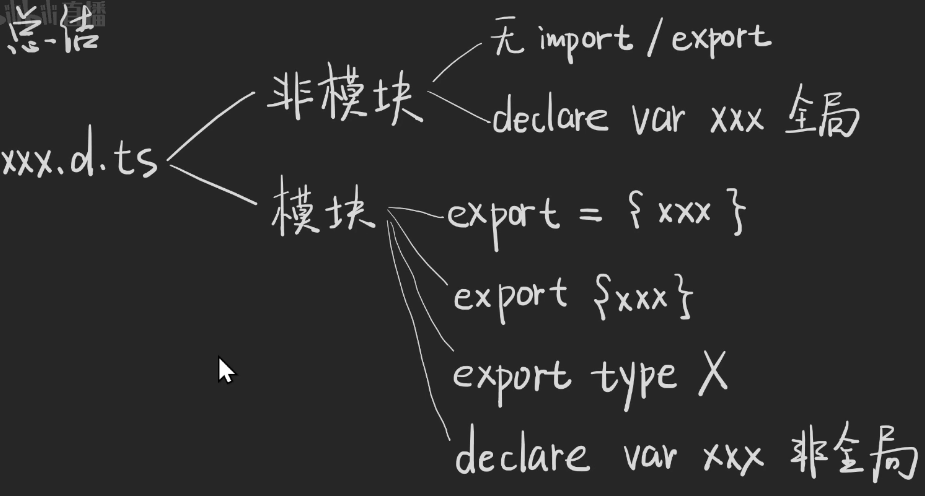
举例type A是声明在当前文件的,而delcare type A是声明在全局的。若要不写export则需要先关闭独立模块。
建议在custom.d.ts文件内声明declare type A = string,同时开启独立模块。
下面的举例内容关闭了独立模块。声明全局函数的时候,可以发现declare可以重载,这是因为早起是先有JavaScript,TypeScript后出,是分开写的,ts也要兼容js的重载功能。
// 全局量
declare var a: number;
declare let b: number;
declare const c: number;
// 全局函数
declare function add(a: number, b: number): number
declare function add(s1: string, s2: string): string
// 全局变量document2
declare namespace document2 {
type Element = string
function getElementById(id: string): Element;
}
// 多层同时声明
declare namespace A.B.C.D {
type E = string
}使用命名空间的时候值可以直接用,类型不可以使用。如下代码图所示。
declare namespace A.B.C.D {
type E = string
let e:E
}const x:A.B.C.D.E = 'xx'
const y = A.B.C.D.e
export {}参考文章:
https://ts.xcatliu.com/basics/declaration-files.html
https://www.typescriptlang.org/docs/handbook/modules.html#handbook-content
https://www.typescriptlang.org/docs/handbook/declaration-files/by-example.html#handbook-content